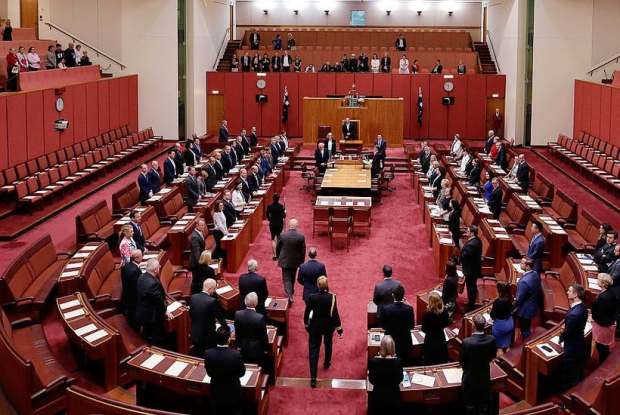The new Adelaide University – an amalgamation of the University of Adelaide and the University of South Australia – will no longer offer face-to-face lectures as from 2026. Lectures would be replaced by ‘rich asynchronous Digital Activities with an equivalent learning volume’ involving the use of podcasts, videos, and other online-friendly materials. There would still be on-campus tutorials and practicals which, however, would not involve the dissemination of substantive content. Surprisingly, considering the potential importance of this decision for offering a first-rate university experience, and for attracting foreign students, few commentaries have evaluated the merits of this decision.
According to Adelaide University, the abolition of lectures is precisely what students want: a flexible environment where students can align their learning activities with their individual circumstances. The University also points to evidence of a discernible trend among the student body to eschew lectures which, to some extent, is the result of the practice of recording lectures. However, this ‘evidence’ detracts from the real function of a university. Indeed, it can be argued that any assessment of this weighty decision requires some reflection on the proper functions of a university. In identifying these functions, it becomes possible to establish minimum requirements without which an institution of higher education cannot be described as a university.
There is no general agreement among educational authorities as to the proper function of a university. Whilst some writers emphasise traditional functions of a university, such as teaching, research and professional training, others argue that they may be used as incubators of social engineering projects aimed at solving perceived social ills in the wider society. In this context, it is useful to briefly review the views of prominent educational commentators regarding the functions of a university. Some commentators, such as Professor John Passmore – who served as a distinguished Philosophy Professor at the Australian National University – limit themselves to affirming that the traditional function of a university is the ‘advancement and the diffusion of learning’. A more nuanced elaboration is offered by Cardinal John Henry Newman, whose classic The Idea of a University, published in 1852, has had an inordinate influence on the development of modern universities. Newman, an advocate of a liberal arts education, described the ‘perfection or virtue of the intellect’ as the core function of a university. But unlike Newman, Karl Jaspers, a 20th Century commentator, strongly emphasised that the idea of a university implied communication among the members of the academic community, which he described as ‘the readiness to relate oneself to things with the aim of getting a picture of the whole in terms of one’s special discipline’. While Jaspers’s book, The Idea of the University, was a rejuvenation of Newman’s notion of liberal education as a proper function of a university, he thus added that active stimulation of original inquiry through communication with others was an important function for a university. Building on these ideas, Professor Alfred North Whitehead argued that the justification for the existence of universities stemmed from the fact that communication between the members of the Academy is done in an imaginative way. He argued that the ‘imaginative consideration of learning’ is the proper function of universities. Whitehead, commenting upon the reasons for the existence of universities, states:
The primary reason for their existence is not to be found either in the mere knowledge conveyed to the students or in the mere opportunities for research afforded to the members of the faculty… The justification for a university is that it preserves the connection between knowledge and the zest of life, by uniting the young and the old in the imaginative consideration of learning. The university imparts information, but it imparts it imaginatively. At least, this is the function which it should perform to society. A university which fails in this respect has no reason for existence.
This brief foray into the literature on the function of the university thus reveals that the imaginative communication of ideas is the essential minimum requirement for an institution to promote itself, or to be recognised, as a university.
The proclivity to use online platforms is undoubtedly a consequence of the Covid pandemic, which mandated online lecturing, thereby severing the face-to-face connection between students and teachers. It was almost inevitable that, post-Covid, the online environment would linger indefinitely and appeal to the burgeoning bureaucracies of universities. This is because online teaching would obviate the need to build new facilities, and the operating costs of the university, including maintenance, security, electricity, room allocation, would be significantly reduced.
However, having conducted may courses online, I am prepared to argue that online teaching is a depersonalised, sterile form of teaching. Typically, in such an environment, students routinely fail to concentrate on their studies and usually neglect the readings needed to benefit from the online teaching. In an online teaching environment, it is hard to reach out to students, especially if there is an expectation of self-directed and self-spaced learning.
It is sometimes said in jest that universities are degree factories, and whilst this may be regarded by bureaucratic myrmidons as a misconceived, even offensive, analogy, it is undoubtedly true. Additionally, although there is considerable evidence that cheating and plagiarising have increased since the adoption of the online learning environment – possibly exacerbated by the concomitant demise of the traditional examination requirement – there is constant pressure on staff to pass all students and any failure is usually characterised as a failure by the teacher to teach their students well.
One interesting question is whether the demise of the lecture will appeal to foreign students. How does the university hope to increase their foreign student intake, considering the international cap on foreign students and the requirement, by some countries, that their students attend face-to-face lectures (as opposed to online) on campus? Moreover, students will miss the campus experience, involving participation in the activities of thriving clubs and societies, and the excitement of discussion among students whose energy and ideas motivate them to change the world. I recall that when I was a student, we spent lots of time in pubs with a good (Belgian) beer and debated the issues of the day – indeed we changed the world drinking beer!
Hence, the excitement generated by learning together with other students, will no longer be a hallmark of the university experience. Those who believe that a university education is about developing imaginative ideas, asking questions of the teacher, and challenging their colleagues, will undoubtedly be brutally disappointed by the decision to discontinue in-person lectures. They may well suspect that the demise of the lecture method will lead to, or result in, a corresponding attrition of freedom of speech. For them, the demise of lectures is perfectly consistent with the ever-growing war on free speech. This is because it is presumably easier to control what is being said on the Internet than in the relative seclusion of an obscure lecture theatre. Additionally, I predict that the draconian Misinformation and Disinformation Bill, currently before the federal Parliament – fittingly abbreviated as the MAD law – will provide a new impetus for universities to conveniently disregard their own Free Speech Code. It is also interesting to note that the abandonment of the lecture method is incompatible with the ‘diversity’ philosophy of the university because it would become more difficult for students to be exposed to, and to fraternise with, students from other countries and cultures.
Of course, these critical comments do not mean that the lecture mode need not be reformed. For too long now, the lecture mode has made it impossible for students to engage with their teachers. This is because classes are typically too large, and three hundred students, crammed in a lecture theatre with students sitting in the aisles, is not an unusual occurrence. In such an environment it is impossible, even disruptive, to engage the professor in discussion, and hence, such a lecture arrangement is not an improvement on the online teaching arrangement. Indeed, unless the university creates an environment where every student can contribute to the class, through discussion and presentations, the lecture mode is not superior to the online teaching arrangement and would also not meet the function of a university, identified above as the ‘imaginative communication’ of ideas. The achievement of the university’s function requires small classes to encourage discussion and debate in class. Nevertheless, in-person teaching is the best education practice because students might be able to concentrate on the lecture provided there are fewer distractions (than sitting in front of a computer at home), and a flamboyant and brilliant lecturer would be able to capture the interests and imagination of students. Moreover, it has been claimed that the completion rate of teacher-led classes is almost five times higher than that of online learning.
Phil Shannon, commenting on Adelaide University’s decision, recently noted in this publication:
The demise of the lecture will accelerate the galloping commodification of higher education as students become mere learning units bearing fees as the old teaching university transforms into an online education supermarket whilst lecturers join the gold rush to mine the richer pickings from government and private research grants.
Ultimately, it is this ‘commodification’ of higher education, facilitated by the decision to ditch lectures, which offends against the true function of the university.

























